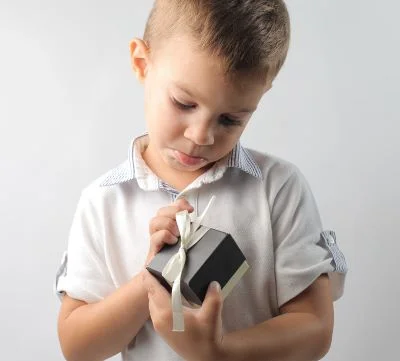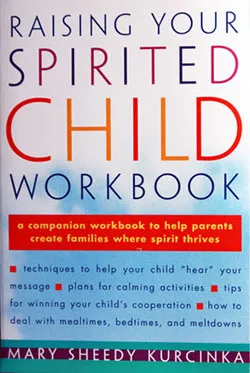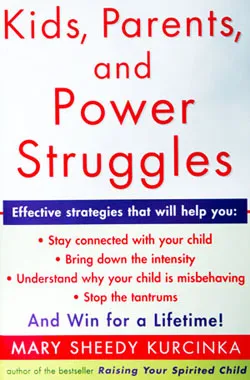How To Help Your Child Give and Receive A Gift With Grace

How to Help Your Child Give and Receive a Gift with Grace
Auntie V’s eyes glistened as four-year-old Ethan unwrapped his gift. Ethan loved dinosaurs and she had spent hours searching on-line for the top-rated dinosaur gifts for this age group. Ethan pulled back the special wrapping paper she had so carefully selected, took one look, and shrieked, “I hate it!” Now jumping up and down he shook it out of his hand like a disgusting spider, threw it across the room, and fled. Auntie V turned to his parents, nostrils flaring, eyes fierce. She did not even need to say it, it was apparent, she would NEVER buy this ungrateful child another gift!
Whether it is receiving or giving them, navigating gift etiquette with a spirited child is a veritable field of landmines. You never know quite what will set it off, or when the explosion will occur, but you can predict it will.
The reality is that everything about gift giving and receiving is a potential trigger for spirited children. Surprises trigger temperamentally slow to adapt children. Lots of people, noise, different smells, and crowding trigger highly sensitive children. A disruption in routine also sets-off slow to adapt children. Add in a cautious first reaction, not liking to be the center of attention, and top it all off with intense reactions and you realize at least one meltdown is inevitable. Even the research describes birthday parties as one of the most significant sources of stress for all four-year-old children, much less our little spirited ones who experience everything more powerfully.
What to do to make it better?
Lower expectations.
- It is not going to be perfect, but we can make it better. Progress, not perfection is our goal.
Set your child up for success.
- Limit the number of people invited.
- Select a time of day when your child is well-rested, and fed.
- Keep the event short.
- Consider holding a celebration in a place YOU can leave if needed.
- If you are not able to control the number of gifts consider opening five gifts, then taking a break to eat, or play games. Then opening five more.
- Let your child know ahead of time if a gift he has wanted is not going to be included, so he can grieve in private.
- You may even wish to have your child help you wrap the gifts, so he knows what is there. Remember you want this to be a happy time. Surprises, even good ones trigger.
Use imaginative play times to practice giving and receiving gifts.
- Days before the event together wrap several toys. Set the stage for your child to role play receiving gifts. Then set the stage for your child watching as someone else opens a gift.
Teach your child what to say and do.
- During the role plays talk about how it feels to open something unexpected. “That was a surprise!” What it feels like to watch someone else open something you would like. “That does not seem fair.”
- Practice saying, “Thank you.” Or “I appreciate that.”
- Decide if your child would prefer to sit on your lap or by herself.
- If she is watching someone else open gifts, select a spot back from the recipient.
- If she is receiving gifts define a “gift space,” so she does not feel crowded.
Have an escape plan.
- Teach your child words to use when he is starting to feel bubbly inside. “I need to get a drink of water or go to the bathroom.” The signal for “I need a break.”
- Have a plan of where your child can go when he needs a break. “Let’s go outside and play catch!”
- Agree, that if he asks to leave, you will go and not try to convince him to stay. Celebrate that he used words to say “I’m done, rather than carrying him out kicking and screaming because he got pushed beyond his ability to cope.
Teach gratitude.
- Even if your child is only a toddler, you can teach gratitude. Along with a verbal thank you,
- You can later have him draw a picture – yes, a scribble is fine.
- Ask him what he’d like to say to auntie, or grandparents and write the words for him.
- As your child grows and matures, he can take on more of the responsibility.
Celebrate the success.
- Later, talk about what went well. If there was a meltdown, set up a role play to practice what to do next time.
One of the “good things,” that may come from this pandemic is smaller, quieter holiday celebrations – perfect for spirited children. Perhaps we will discover new traditions that fit and feel better.
Display All Posts
Search by Topic:
Popular Posts:
- When your child yells at you: Expecting and Coaching respectful behavior
- 5 Tips to Stop the 'Strike out Tantrums:' Hitting, Biting, Kicking and Name-calling
- Why is my child suddenly clingy?
- Ten Steps to a Peaceful Bedtime for Your Spirited Child
- When Your Child’s Meltdowns are Ruining Vacation






